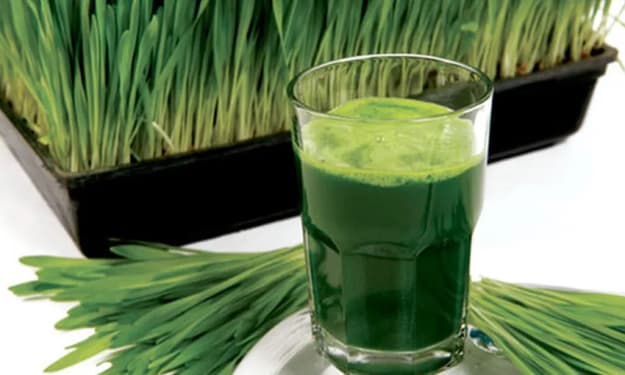
SELF-REGENERATION OF THE HUMAN ORGANISM IS NOT A MYTH! EVERY 7 YEARS, THE BODY "RENEWS", BUT WE NEED TO KNOW HOW TO STIMULATE THIS PROCESS
The human body has an amazing ability to self-regenerate. Cells die and new ones are born, but they have a different lifespan, so the organs renew themselves at different rates. For example, red blood cells go through a complete life cycle in four months, white cells in one year. The skin changes once every 2-3 weeks, the colon every 4 days, the bones every 10 years. But once every 7 years, all the cells in the body end their regeneration process. Every 7 years we are different people. However, this process can occur less frequently due to accumulated toxins, which slow down cell regeneration. We can naturally stimulate this process, through an adequate diet, thus prolonging our youth.
The liver can recover in 5 months
The cells of the human body age, die, and are replaced by new ones. About 50-70 billion cells die every day in the human body. In one year, in an adult organism, the mass of dead cells is equal to the mass of the individual. Once every 7 years, the body is almost completely regenerated. The power of cell regeneration and survival depends on the energy received, and this energy must in turn be renewed. There are several methods of refueling biofuels. Some theories speak of an energetic-informational stimulation (bioresonance, homeopathy, bioenergotherapy, integrated medicine, phytotherapy, gemotherapy), which would lead to the formation of stem cells, those that regenerate the tissues, restoring the diseased ones. But the most convenient way to rejuvenate our body is to eat healthy. Each organ has its own rhythm of aging and regeneration. For example, the liver, very well vascularized, has an amazing power of recovery, recovers completely in five months and even faster. If 70% of a person's liver is removed by surgery, it will grow back almost completely in just two months. Even alcoholics' livers can regenerate, as liver cells renew themselves every 150 days. If this did not happen, the body would fill up with waste and stop working. In the case of cirrhosis, however, the liver no longer has any functional cells and cannot regenerate. Foods rich in folic acid and vitamin B complex are recommended to help the liver rejuvenate. Remedies that protect the liver: licorice, dandelion, silymarin, aloe juice, salmon oil, alfalfa, parsley, carrot, oregano, ginseng, armory. Elders say that yellow plants and flowers are ideal for liver health.
The heart rejuvenates every 20 years
Until recently, it was believed that the heart did not have the ability to regenerate. A recent study found that this organ is endowed with stem cells that rejuvenate constantly, at least 3 or 4 times during its life. If the heart did not regenerate, its lifespan would be only 20 years. After the age of 35, the heart gets tired and slows down, the maximum number of contractions per minute decreasing by one beat per year. The heart also shrinks by an average of 0.3 grams each year, pumping less and less blood into the body. Like all other muscles, the heart stays in shape with exercise. Regeneration of heart cells can be done with neocardiogenic substances, capable of stimulating the formation of healthy heart tissue. These heart-healthy substances are resveratrol (grape extract) and ginseng. Remedies that stimulate stem cells and thus rejuvenate the heart: infusion of Hungarian and royal jelly. For the heart to function properly, the blood must also be healthy, as must the vessels through which it circulates. The red blood cells live for about four months. A single drop of blood contains millions of such cells, which help carry oxygen. Iron facilitates this process, so it is good to eat red meat, eggs, chicken or beans, corn, beets, cocoa. Plants that fight anemia: vines, wild chestnut flowers, hawthorn, pine, pumpkin, celery. Narrowed blood vessels can regain their optimal size through the body's own strength, which can even build new arteries. A diet low in salt and cholesterol is essential. Eggplant, carrots, onions, soybeans, fish, yogurt, sunflower oil, apples, quinces, oat bran and barley bran are recommended. Among the plants, watercress, leek, garlic, horseradish, cabbage juice are useful.
New intestines, every 3 days
The lungs contain several types of cells, which renew themselves at different periods of time, most of which need the alveolar tissue: about a year. On the other hand, the cells on the surface of the lungs regenerate every 2 or 3 weeks. Pulmonary emphysema, however, can prevent cell regeneration by permanently destroying alveolar tissue cells. Vitamin A (retinoic acid) is recommended for faster and more efficient lung regeneration. A single serving of carrots, sweet potatoes or mango provides the recommended daily dose of this vitamin. Smoking cessation and outdoor exercise are also important. Antioxidants help restore the lungs. Vitamin C and flavonoids are found in fresh fruits and vegetables, especially berries, greens (broccoli), tomatoes, peppers and cherries. Dairy products, fish, water and coffee improve lung activity. The age of the intestines is only 2-3 days. This is because the intestines are exposed to highly corrosive chemicals, such as gastric acid. Certain portions, which are protected with mucus from this acid, regenerate every 3-5 days. The cells of the intestinal mucosa are nourished and regenerated in a proportion of 70% with the help of Omega fatty acids. They provide protection against cancer and inflammatory bowel disease. Fries and alcoholic beverages affect the lining of the intestines. The best regenerators of the intestines are: sauerkraut, plantain, sea buckthorn, arnica. 25-30 grams of fiber are needed every day. The lining of the stomach (mucus) changes completely every 5 days.
In men, nails and hair regenerate faster
The taste buds, or rather the taste receptors, have a lifespan of only 10 days. On the surface of the tongue there are about 10,000 receptors that help us detect aromas, in the elderly their number can be reduced by half. Infections and smoking can affect receptors and their regeneration. In the eyes, the only component that regenerates throughout life is the cornea, less than 24 hours after the accident. For a good view, we need to eat fish, carrots, blueberries, eggs, garlic, spinach. The eye is protected by eyelashes. The upper ones have around 150-200 bristles, and the lower ones 75-100. Eyelashes fall out and are replaced by others every two months. The age of the hair depends on its length, but it usually grows one centimeter per month. In women, hair is completely restored once every six years, in men, once every three years. Every year, we lose more than 35,000 hairs as a result of this natural renewal cycle. The number of these lost threads can be higher under the influence of stress, smoking, nutrient-deficient diet. Eyebrows recover in about 6-8 weeks. Toenails grow 3-4 millimeters a month, twice as fast as toenails. Toenails regenerate in 6 months, while toenails recover in 3 months. The explanation is that the latter are better vascularized. The nails of young men and women grow faster due to better circulation. Inexplicably, the fingernails on her fingers grow slower than the other. For the health and regeneration of nails and hair, we recommend: eggs, vegetables, salmon, beans, nuts, oranges, whole grains, chicken, dairy, water, liver, tomatoes, avocados, sunflower seeds, turkey , green peas.
Foods that rejuvenate the skin
The skin is renewed every two weeks, in order to better protect the body against the various substances it comes in contact with, but also to be able to recover from injuries. However, as we age, the epidermis loses its elasticity due to lack of collagen and dehydration, which reduces its ability to self-regenerate. The largest human organ, the skin, reduces its weight by about 4 kilograms. For healthy skin, we need to eat: fiber, whole grains, foods rich in Omega-3 fatty acids (fatty fish, avocado, nuts, flax seeds, pumpkin seeds, almonds), meat, fish, eggs, crude vegetable oil and oilseeds, berries, citrus fruits, tomatoes. The intercostal muscles regenerate once every 15 years. After the age of 25, we begin to lose about 250 grams of muscle mass, the most affected areas being the hips, legs and back. This inevitably leads to a decrease in the body's flexibility and physical endurance, leading to a predisposition to accidents. Foods that increase muscle mass: beef, almonds, beets, brown rice, oranges, melons, eggs, milk, cottage cheese.
Only a part of the brain regenerates
Neurons are the only cells that do not regenerate. Specifically, our brain starts with the cells we have at birth, about 100 billion. As we age, some of the cells degrade, which explains the dementia attacks in some people. However, there are two areas of the brain that regenerate: the olfactory bulb, which is responsible for the sense of smell, and the hypothalamus, which is responsible for the ability to learn. The cerebellum is 3 years younger than the body. This part of the brain is located in the back of the brain and controls motor and balance functions. Although it accounts for only 10% of the total brain, it is home to more than half of the neurons. It is one of the first areas to develop in babies. The brain begins to shrink at the age of 20 and, during its lifetime, loses about 10-15% of its weight. At birth, it weighs about 400 g, in adolescence it weighs about 1.4 kg. We lose one gram of brain weight a year. That's 100,000 neurons. Scientists cannot explain why neurons do not regenerate, but it is thought that the accumulation of toxins is to blame. Problems are accelerated by smoking, alcohol, diabetes, obesity, high cholesterol. Scans show that the frontal and temporal lobes shrink the most. However, this process does not affect the ability to think and concentrate. By using our brain intensely, it becomes stronger. The best foods for brain health are: berries (blueberries), nuts, avocados, bananas, eggs, salmon, eggplant, coffee, dark chocolate, yogurt, green tea, green leafy vegetables, raw carrots, red wine, cereals whole grains, garlic.
The bone is renewed every 10 years
The bones are constantly recovering, but the complete regeneration process ends every 10 years. Osteocytes help restore bones, and osteoblasts build the bone matrix and mineralize the bone. The regeneration process slows down around the age of 45, when the onset of osteoporosis can begin, especially in women. Bone density is highest at 20 years. The spine also recovers, but most people lose an inch every decade from the age of 40 due to the curvature of the spine. The 23 intervertebral discs, which absorb shocks to the spine, gradually compress. Especially during the day they settle, but settle back during sleep. In the morning, a man's height is 1-1.5 centimeters higher than in the evening. But as we get older, our discs do not recover. Decreased height is a sign of osteoporosis, especially in women, and in men it can also be a heart problem. Those who lose 2.8 centimeters or more in 20 years are 46% more prone to coronary heart disease. Only one-fifth of people manage to maintain their height with age. People who lose height, according to a recent study, are more prone to hip fractures. As the years go by, the bones of the face also shrink, the first being the jaw, due to the loss of teeth. For bone regeneration, the food should contain foods rich in calcium (dairy, green leafy vegetables) and vitamin D (fatty fish, broccoli). Avoid smoking, alcohol and excess caffeine. Researchers have found that people who do aerobics regularly lose only half of the inches lost by most people.
Some organs shrink, others grow
The bladder also shrinks. At 25, a normal person's bladder can hold about two cups of fluid, but by age 65, the volume is halved. Avoid excessive alcohol and coffee, as they irritate the bladder. However, some organs grow with age. The inner part of the earlobe remains the same size, but on the outside most of the ears lengthen as the cartilage continues to grow even after the bones have stopped growing. Thus, in old age they begin to hang. The soles of the feet lengthen and widen over time as the tendons and ligaments lose their elasticity. Every 10 years, a person can increase by half or even a number on the shoes. The sexual organs of women and men shrink with age. The mammary glands also feel aging, so the breasts lose volume and sag. The volume of sperm is reduced by about 0.03 milliliters, and the number of sperm capable of fertilization by 2.5 million. After the age of 27, women's eggs age prematurely. A diet low in fat and as healthy as possible will ensure a good sex life for as long as possible. Every year, we gain about 700 grams of fat, even if we don't change our eating habits or lifestyle.
About the Creator
MGS
Quora Content Creator / Spaces Admin / DigiNomad






Comments
There are no comments for this story
Be the first to respond and start the conversation.